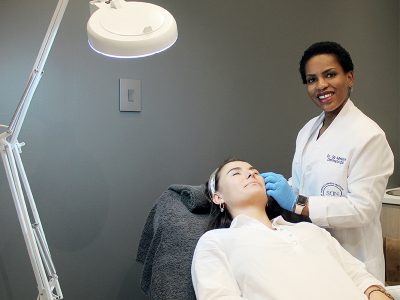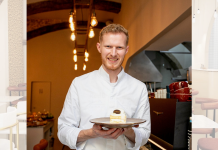Dr S’lindile Ndwalane practises life-saving medical dermatology at a government hospital in the mornings … and turns her attention to the cosmetic and aesthetic in Hyde Park in the afternoons.
Book an appointment with the good doctor, Dr S’lindile Ndwalane – affectionately dubbed Dr Sli – and know that you are in the best possible hands when it comes to skincare.
A Fellow of the College of Dermatologists of South Africa, a member of the Dermatology Society of South Africa, with a Master’s degree in Dermatology on top of her MBBCh, and specialised training in aesthetic medicine to boot, you couldn’t ask for someone more qualified – or passionate – about the work she does.
Dr Sli divides her time between Thelle Mogoerane in Vosloorus and the Specialist Laser and Cosmetic Institute (SCIN) in Hyde Park Corner. The former, a government hospital on the East Rand; the latter, a medical aesthetic and cosmetic institute in the northern suburbs. These are two very different spaces but don’t ask Dr Sli to choose between them! ‘At Thelle Mogoerane, it’s medical dermatology with diseases ranging from inflammatory conditions like eczema to skin cancers. At SCIN, the focus is more cosmetic and aesthetic and it’s exciting as there are no resource-based limitations to what can be achieved. But at Thelle, I get to do real life-saving procedures, which is more fulfilling,’ Dr Sli says.
This passion is evident in Dr Sli, whose face lights up as she talks about one of her biggest success stories. ‘A healthy young lady developed seizures while 16 weeks pregnant and was given anti-epileptic drugs (usually completely safe to use in pregnancy). She then, unfortunately, developed a severe drug reaction called ‘toxic epidermal necrolysis’ where the skin is shed off (as it does with burns) on more than 60 per cent of the body. After two months in ICU and high care, she survived and was able to carry the pregnancy through to term and gave birth to a bouncing baby girl. She actually came back to show us the baby after giving birth. Those wins are just priceless.’
I realised that there aren’t a lot of dermatologists, especially black, female dermatologists, in our country
So how does she manage to juggle the demands of two very different positions? ‘After dropping my son off at school, I go run my clinic where I see patients of all ages – from day-old babies to the elderly with skin, hair or nail diseases. I also do minor surgical procedures, and, as acting head of dermatology at the hospital, I sometimes attend management meetings as well as teach medical students and intern doctors.’
Then she hops in the car, completing a mental shift from medical dermatologist to aesthetic dermatologist as she drives to Hyde Park. ‘A different mindset and approach is needed in both spaces but the same scientific thinking applies in both spheres. A diagnosis is also required. Pigmentation is not a diagnosis but it is, nonetheless, a ‘cosmetic’ concern and thus needs effective management based on the underlying cause.’
For Dr Sli, dermatology has been a calling since she was in medical school. ‘I realised that there aren’t a lot of dermatologists, especially black, female dermatologists, in our country. I found the speciality interesting and we didn’t spend much time on it in undergraduate training so that prompted me to study further.’
Her favourite thing about her work is the confidence it provides her patients. ‘The skin is the largest organ of the body. It’s the first thing you see when looking in the mirror and the first thing people see when they look at you. The impact of a skin condition on mental well-being cannot be overlooked. Moreover, it’s a ‘window’ into what’s happening inside the body.’
Surprisingly, Covid-19 hasn’t had too much of an impact on her practice at SCIN. ‘With everyone spending so much time at home, people have actually found the time to do all those procedures they’ve been putting off without worrying about downtime.’ But that doesn’t mean they’re skimping on safety. ‘We work strictly on appointments only and limit the number of people in the waiting room to ensure social distancing. And, of course, we sanitise constantly.’
Covid-19 has also changed the problems some patients are facing. ‘Maskne is prevalent – acne caused by friction and humidity from constant mask-wearing, leading to blocked pores and bacteria build-up. As a result, there’s post-acne pigmentation and scarring which requires ongoing treatment. We have also seen allergic reactions to mask materials but, on the plus side, the masks are protecting us from the sun – but that doesn’t mean you get to skip the sunscreen – ever!’
Details: For a hands-on experience with Dr Sli to work her magic, be sure to contact SCIN in Hyde Park on 010-350-0800, email [email protected] or visit scinmed.com
* Text: Tayla Blaire. Photographer: DJ Busang. Details: busangphotography.co.za

Dr Sli’s top tips for fighting maskne
- Wash your face twice daily with a gentle, fragrance-free cleanser, containing gentle exfoliators
- Avoid harsh, granular exfoliators
- Use a lightweight, non-comedogenic (doesn’t clog pores) moisturiser
- Include hyaluronic acid in your skin regimen where possible
- Use vitamin C products during the day
- Avoid using heavy, comedogenic make-up
- Add vitamin A (retinol) to your night routine
- Wear sunscreen every single day
- Wash or change your mask daily






